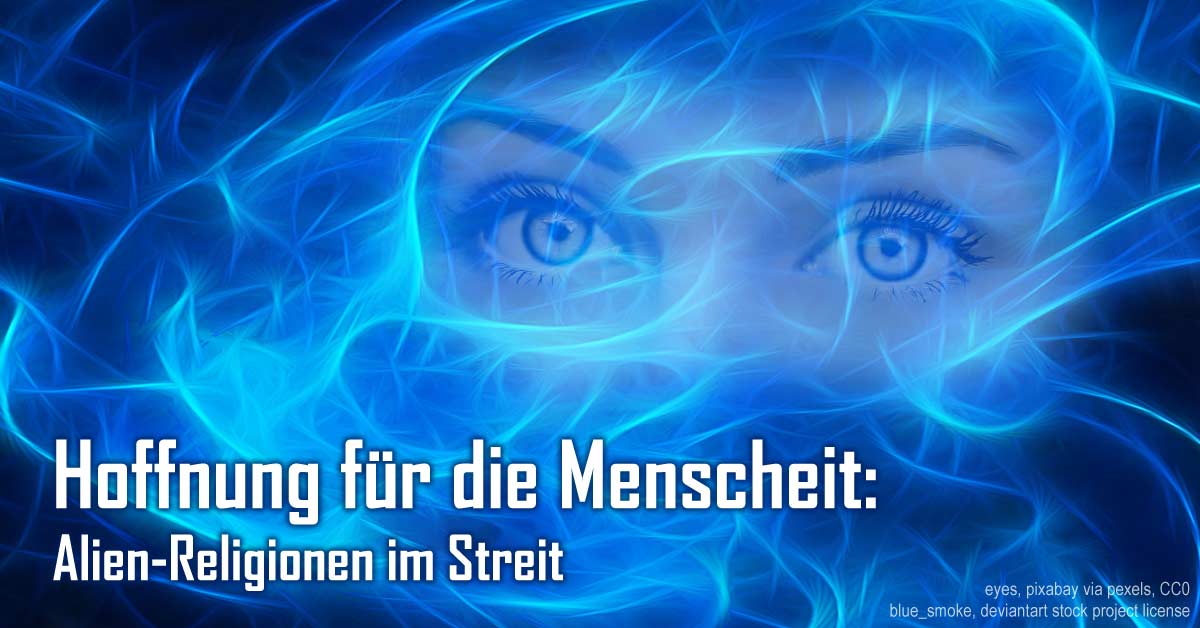
2997 Alien-Religionen im Streit

Reshumana, die Allianz zur Befreiung des Solsystems von der dellianischen Fremdherrschaft, erhält einen Versorgungsstützpunkt beim Saturn. Rohstoffe und Material für die Aktivitäten im Solsystem können nun lokal beschafft werden und müssen nicht mehr über interstellare Distanzen transportiert werden. Ein wichtiger Schritt für die Rückgewinnung des Solsystems.
-- 2967, 30 Jahre vorher --
Ein Mann geht die Rampe hinunter auf das Dock des Titan-Terminals. Er ist groß, athletisch und charismatisch. Noch ist er ein Niemand. Keiner kennt ihn. Aber das wird sich bald ändern. Er ist Dellianer und er wird in der dellianischen Hierarchie aufsteigen. Dafür wurde er gemacht. Er hat ein Multitasking-Bewusstsein, ein beschleunigtes Nervensystem, Assoziationsbooster, die dellianische Variante des Ninja-Upgrades und genetisch angelegte Genie-Fähigkeiten im Memetik-Bereich. Er ist überzeugend. Er weiß, wie man sich durchsetzt und er wird sich durchsetzen. Er braucht 20 Jahre bis an die Spitze. Dann wird er Satirax, der Beschützer des Saturn. Er glaubt, er kommt von den schwebenden Habitaten der Venus. Aber das ist eine eingepflanzte Erinnerung. Tatsächlich kommt er aus einem Spezialprogramm des memetischen Abwehrdienstes von Valerius.
--
Die Tatsache, dass Satirax, der dellianische Beschützer des Saturn, den Menschen einen Stützpunkt gewährt, erscheint wie ein Wunder. Diese Öffnung bedroht die Herrschaft der Dellianer im Solsystem. Das weiß Satirax genauso wie der Beschützer von Sol auf der Venus und alle anderen Protektorate im System. Aber für die lokalen Beschützer ist die Kontrolle ihres eigenen Machtbereichs wichtiger als die eher abstrakte dellianische Gesamtherrschaft. Der Vorgang ist die Folge einer religiösen und wirtschaftlichen Entwicklung im äußeren System.
Satirax erhält für die Überlassung des Stützpunkts eine Pacht und für Ressourcenextraktionsrechte technische Unterstützung der Reshumana und einen Anteil an den gewonnenen Rohstoffen. Für den Beschützer des Saturn ist der Handel dringend nötig, denn das Protektorat Saturn ist in wirtschaftlichen Schwierigkeiten. Die nach der Eroberung übernommene Infrastruktur ist nun gut 200 Jahre alt und schlecht gewartet. Ausrüstung, die auf dem Höhepunkt der Barbarenwelle geplündert wurde, ist sogar über 300 Jahre alt. Obwohl Autofabs und Reparaturschwärme sehr lang selbständig laufen können, macht sich der Verschleiß inzwischen bemerkbar. Gleichzeitig befindet sich die Bevölkerung im Niedergang. Es gibt nicht genügend Fachkräfte unter den menschlichen Sklaven und autonomen Mechs, um alle Anlagen manuell zu warten oder zumindest Wartungsbots in Betrieb zu halten. Der Niedergang der Wirtschaft reduziert das interplanetare Handelsvolumen zwischen äußerem und innerem System. Luxusgüter aus dem inneren System sind für den Saturn inzwischen unbezahlbar.
Die Schwierigkeiten des Saturn werden verstärkt durch ein religiös motiviertes Embargo der anderen äußeren Protektorate. Um das Jahr 2990 war Satirax mit seinem Hofstaat vom speziellen Uthoismus zum allgemeinen Uthoismus übergetreten. Die Lehren des allgemeinen Uthoismus gelten den Anhängern des speziellen Uthoismus als Frevel. Aus der Sicht des speziellen Uthoismus sind die Allgemeinen schlimmer als Ungläubige, denn sie ignorieren nicht nur die Lehre des Uthoismus, sondern sabotieren diese.
Kern des Uthoismus (Hindi, "sich erheben") ist die These, dass das Leben ein Auftrag des Universums ist, nach dem höchsten Glück zu streben. Mit dem Erreichen des perfekten Glückszustands kann das Individuum seine weltliche Hülle verlassen und zum transzendenten Wesen im Einklang mit dem Universum werden.
Bürger in wohlhabenden Zivilisationen – und die Mächtigen in allen anderen technisch hochentwickelten Gesellschaften – sind im Wesentlichen unsterblich. Sie leben sehr lang in biologischen Körpern, später mit künstlichen Organen und technischer Unterstützung und schließlich als Uploads in Androidenkörpern oder in Simulationen. Der Tod ist eher ungewöhnlich. Das schadet der Attraktivität von ewigem Leben und Wiedergeburt nach dem Tod. Stattdessen wird in vielen Religionen eher ein besonders bemerkenswertes Ende nach einem langen guten Leben angestrebt. Das gilt auch für den Uthoismus, wo die Gläubigen das Ziel haben, nach einem langen glücklichen Leben auf dem Höhepunkt des Glücks mit dem Universum eins zu werden. In der Praxis werden zur Erreichung des transzendenten Zustands oft technische und biochemische Hilfsmittel verwendet.
Orthodoxe Uthoisten lehnen solche Hilfsmittel ab. Sie versuchen durch ihren gesellschaftlichen Status und die damit verbundene Macht glücklich zu werden. Dafür streben sie die höchsten Ebenen der dellianischen Hierarchie an. Sie vertreten den speziellen Uthoismus bei dem nur die Besten und Mächtigsten den höchsten Zustand erreichen. Orthodoxe Uthoisten sind oft sehr machtbesessen, rücksichtslos und erfolgreich. Für die Gläubigen des speziellen Uthoismus ist das Glück ein Nullsummenspiel. Andere müssen verlieren, damit sie gewinnen können. Nur wenigen Individuen ist es vergönnt, den transzendenten Zustand zu erreichen. Da Glück und Reichtum korreliert sind, haben die Mächtigen die besten Chancen. Daraus leiten die Mächtigen einen größeren Anspruch ab und im Umkehrschluss keinen Anspruch auf Transzendenz – und keine Notwendigkeit für Glück oder ein gutes Leben – für niedrigere Ränge und Sklaven.
Im allgemeinen Uthoismus ist das Glück dagegen unbeschränkt und jeder Sophont kann die Transzendenz anstreben. Nach dem allgemeinen Uthoismus gilt das auch für Sklaven, obwohl deren Weg offensichtlich weiter und schwerer ist. Anhänger des allgemeinen Uthoismus werden von den Speziellen gehasst und verfolgt, da die Speziellen der Meinung sind, dass die Allgemeinen ihre Chancen auf Transzendenz verringern.
Unter Dellianern dominiert der spezielle Uthoismus. Viele Spezielle bemühen sich, ihre eigenen Chancen zu verbessern, indem sie andere am Glück hindern. Besonders menschliche Sklaven, aber auch niedrige dellianische Ränge werden schlecht behandelt oder sogar misshandelt, um deren Glückspfad zu erschweren. Jede Ebene der dellianischen Hierarchie im Solsystem versucht die untergeordnete Ebene zu unterdrücken. Auch viele Sklaven haben den Uthoismus angenommen oder handeln zumindest entsprechend, um nicht negativ aufzufallen. Dadurch zieht sich die Praxis der Misshandlung von Untergebenen bis in die Ränge der Sklaven. Uthoismus ist nicht nur eine Religion, sondern auch ein effizientes Unterdrückungsinstrument.
Mit dem Übertritt zum allgemeinen Uthoismus verrät Satirax aus Sicht der dellianischen Mehrheit den Uthoismus. Unter der Herrschaft von Satirax dürfen sich alle Sophonten auf den Glückspfad begeben, auch wenn der Weg für die Sklaven sehr schwierig ist. Für orthodoxe Uthoisten verringern sich dadurch ihre Chancen auf Transzendenz. Sie bekämpfen deshalb Allgemeine wie Satirax. Mit dem Embargo gegen das Saturn-Protektorat versuchen die anderen Beschützer, Satirax in die Knie zu zwingen, um wieder einen Rechtgläubigen als Beschützer des Saturn einzusetzen. In der Not öffnet Satirax sein Protektorat für Reshumana, die interstellare Allianz zur Rückeroberung des Solsystems. Ein wichtiger Schritt für die Reconquista.
-- 2987, 10 Jahre vorher --
Eine Frau geht die Rampe hinunter. Sie ist schön, atemberaubend schön, nicht für Menschen, aber für Dellianer. Für Dellianer ist sie eine Göttin. Sie ist intelligent, aufmerksam, unterhaltsam, zurückhaltend, manchmal auch ausgelassen und wild. Sie ist das personifizierte dellianische Schönheitsideal. Das Ergebnis von 200 Jahren Optimierung, von Simulationen, Tests und Iterationen. Die ursprüngliche Genvorlage basiert auf Jahrtausenden natürlicher Selektion in den Palästen von Dellia, lang bevor dellianische Krieger interianische Raumschiffe bestiegen, um den Sektor zu erobern. In den Labors von HR-Technologies auf Valerius wurde ihre Genlinie für den Auftrag präpariert. Moderne solare Gensynthese angewendet auf die dellianische Biologie. Die Genlinie – ihr dellianischer Name bedeutet Andromeda, nach unserer Nachbargalaxie – war schon lang ein Ideal. Auf Valerius bekam sie zusätzliche Empathiebooster, Intelligenz-Upgrades und die genetische Programmierung, ihren Auftrag zu lieben. Sie wurde mit den modernsten Methoden ausgebildet und ist an planmäßig gestellten Herausforderungen zu einem selbstbewussten Charakter herangewachsen. Ein wichtiger Teil ihres Lebens war immer der Glaube an das Glück für alle Wesen. Sie wurde erzogen im Glauben, dass alle eine Chance haben sollen, sich zu erheben und mit dem Universum eins zu werden, eine milde Form des allgemeinen Uthoismus. Sie ist das Endprodukt einer langen Reihe von Optimierungen, in der Genvorlage und in den prägenden Erlebnissen ihrer Jugend. Sie ist perfekt, perfekt gemacht. Perfekt für eine Person: den Beschützer des Saturn. Sie ist das Geschenk eines Marui-Handelsfürsten für den Herrscher des Saturnsystems. Ihr Auftrag: Satirax vom wahren Glauben zu überzeugen.
--
Valerius war schon früh immer wieder von Barbarenüberfällen betroffen. Die Angreifer kamen mit automatischen Waffensystemen, die sie aus interianischen imperialen Depots entwendet hatten. Die Heimatverteidigung von Valerius hatte keine Chance. Deshalb waren einige Leute auf Valerius der Meinung, dass man nicht bei der Technik, sondern bei den Besatzungen der Raumschiffe ansetzen müsste, vielleicht sogar bei ihren Anführern.
Das Spartakus-Projekt sollte die hochentwickelte solare Gentechnologie für Alien-Biologie nutzbar machen. Vor allem für Dellianer und andere Völker aus den Badlands. Das Projekt entwickelte Genvorlagen und optimierte Individuen. Nicht alle waren davon überzeugt, dass es eine gute Idee ist, den Dellianern perfekte Anführer zu geben. Aber wenn man etwas so gut kennt, dass man es perfektionieren kann, dann kennt man auch seine Schwachstellen. Und die Produkte des Spartakus-Projekts haben eine Schwachstelle: eine genetisch eingestellte Neigung zu Andromedas.
Mehr Philosophie und Religion
2165 Yksityiskohta World Jam
2940 Das Recht des Stärkeren
2997 Alien-Religionen im Streit
3075 Sabotage des Ökoformings
Neue Beiträge
3353 Tor der Kontroverse
3361 Erste Menschheit
2158 Space Patrol
2222 Weltraumpiraten
2326 Kein interplanetarer Krieg
3050 Königliche Garde
3090 Solo Ehre
2234 Am Ende des Orbits
2248 Gemini-Katastrophe
2366 Orbitale Ökonomie
2312 Kaio-Artefakt
2333 Metrische Impulsverstärkung
2337 Verschwörung im Orbit
2247 Quantensprung
2284 Trennung der Erde
2321 Isolation der Erde
2205 Unternehmensnationen
2192 Antiexpansionistischer Terror
2179 Private Asteroidenbasis
2231 Vereinte Planeten
Die Besten
(20 von 75)
2158 Space Patrol
2205 Unternehmensnationen
2231 Vereinte Planeten
2333 Metrische Impulsverstärkung
2337 Verschwörung im Orbit
2445 Scum-Festival
2469 500 Jahre Tranquility
2518 Geheime interstellare Mission
2587 Alien gegen Alien
2648 Abenteuerliche Reise
2681 Roboterzivilisation
2725 Auch Maschinen haben ein Gewissen
2743 Kisor's Geschichte
2997 Alien-Religionen im Streit
3131 Roboter und Drachen
3190 Überraschungsangriff
3191 Umzug nach Cobol
3270 12.000 Jahre Geschichte
3308 Supernova
3365 Quantensprung
 2988
Rama-Aufstand
2988
Rama-Aufstand

 3010
Wiederbesiedlung Kisors
3010
Wiederbesiedlung Kisors